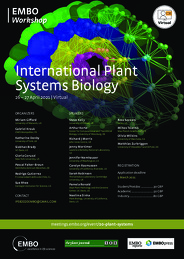About the Workshop
This EMBO Workshop on international Plant Systems Biology (iPSB) is the central gathering of plant systems biology researchers from across the world. Climate change poses unique challenges for how to feed and power humanity without further degrading the environment. Plant science therefore is a key discipline in meeting the challenge of adapting food and energy production and society to the consequences of climate change. Towards the understanding of complex genotype-phenotype relationships, systems biology approaches, i.e. global omics and quantitative modelling, need to complement classic genetics and cell biology. Building on the success of the first iPSB in Roscoff in 2018 and with having to postpone our plans for Venice, Italy in September 2020, we are now delighted to be able to offer the second iPSB virtually. There will be invited talks, talks selected from abstract submissions, an online poster session and time to network at virtual tables.
As systems biology has many facets it is important to bring together researchers taking a variety of approaches, in order to mesh these directions towards a deeper understanding of biological systems. Each of our six workshop sessions is accessible to non-experts to ensure cross-fertilisation since there are strong but not yet fully realised links between researchers across systems biology. We particularly encourage applications from early career researchers and the size of the meeting offers a tremendous chance for interaction, building a future for this exciting discipline. Around half of the oral presentations will be selected from abstracts.
- Session 1 - Gene Regulatory Networks
- Session 2 - Metabolic Networks
- Session 3 - Synthetic Biology
- Session 4 - From Single Cell Genomics to Tissue Modeling
- Session 5 - Evolutionary Networks and Systems
- Session 6 - Integrative Systems Genomics
About EMBO Courses and Workshops
EMBO Courses and Workshops are selected for their excellent scientific quality and timelines, provision of good networking activities for all participants and speaker gender diversity (at least 40% of speakers must be from the underrepresented gender).
Organisers are encouraged to implement measures to make the meeting environmentally more sustainable.





